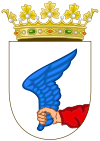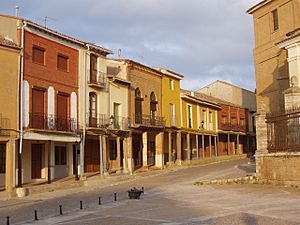Villalón de Campos facts for kids
Quick facts for kids
Villalón de Campos, Spain
|
||
|---|---|---|
|
||
| Country | Spain | |
| Autonomous community | Castile and León | |
| Province | Valladolid | |
| Municipality | Villalón de Campos | |
| Area | ||
| • Total | 70.33 km2 (27.15 sq mi) | |
| Elevation | 843 m (2,766 ft) | |
| Population
(2018)
|
||
| • Total | 1,606 | |
| • Density | 22.835/km2 (59.143/sq mi) | |
| Time zone | UTC+1 (CET) | |
| • Summer (DST) | UTC+2 (CEST) | |
Villalón de Campos is a small town, also called a municipality, located in the province of Valladolid. This province is part of Castile and León, which is one of Spain's 17 main regions. It is a quiet place in the heart of Spain.
Contents
About Villalón de Campos
Villalón de Campos is a charming town in the northern part of Spain. It is known for its history and traditional Spanish feel. The town is a great example of the many small communities that make up the country.
Where is Villalón de Campos located?
The town is found in the Castile and León region. This area is famous for its wide open spaces and historic cities. Villalón de Campos is specifically in the province of Valladolid. This province is known for its farming and cultural heritage.
How many people live there?
According to a count from 2018, about 1,606 people live in Villalón de Campos. The number of people living in the town has changed over the years. For example, in 2004, there were about 2,040 residents. Small towns like Villalón de Campos often see their population change over time.
What is a municipality?
A municipality is like a local government area. It includes a main town or city and the surrounding countryside. Villalón de Campos is one of many municipalities in the province of Valladolid. Each municipality has its own local government, led by a mayor. The current mayor of Villalón de Campos is Javier Mazariegos.
What is the weather like?
Villalón de Campos has a climate typical of inland Spain. Summers are usually warm and dry. Winters can be quite cold. The town uses Central European Time (CET), which is one hour ahead of Coordinated Universal Time (UTC). During summer, they switch to Central European Summer Time (CEST), which is two hours ahead of UTC.
See also
 In Spanish: Villalón de Campos para niños
In Spanish: Villalón de Campos para niños
 | Tommie Smith |
 | Simone Manuel |
 | Shani Davis |
 | Simone Biles |
 | Alice Coachman |



